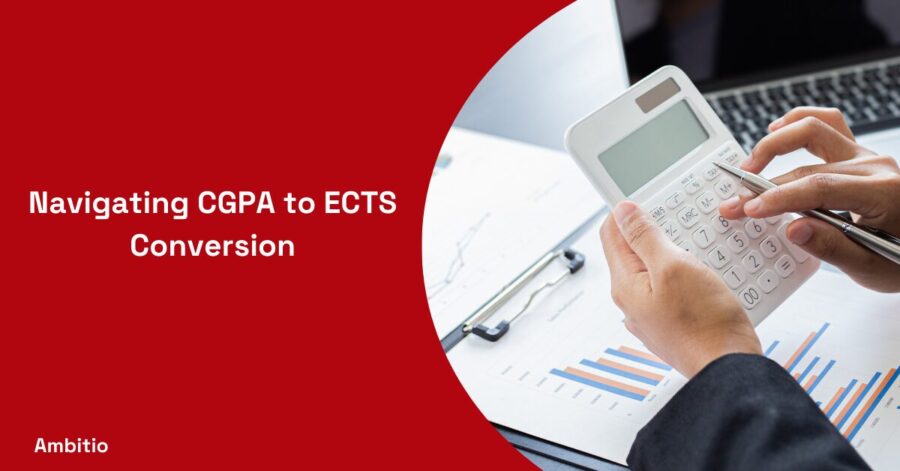13 December 2024
4 minutes read
Navigating CGPA to ECTS Conversion: A Comprehensive Guide for International Students

Introduction
In the world of international education, understanding how to convert your Cumulative Grade Point Average (CGPA) into European Credit Transfer and Accumulation System (ECTS) credits is a critical step for academic success. This conversion is particularly important for students planning to study in Europe or for those transferring credits between universities globally.
The Importance of ECTS for Global Education
Decoding ECTS: A Gateway to European Education
ECTS serves as a cornerstone in the European higher education area, facilitating student mobility and academic recognition across countries. One ECTS credit is generally equivalent to 25 to 30 hours of study, encompassing class time, assignments, and self-study. Understanding this system is crucial for students aiming to align their academic efforts with international standards.
The Mechanics of the ECTS System
The ECTS framework is designed to provide transparency and consistency in higher education across Europe. It helps in translating and comparing grades, ensuring that students receive fair recognition for their studies abroad.
The system is based on the principle that 60 credits measure the workload of a full-time student during one academic year. Therefore, a typical Bachelor’s program in Europe, spanning three years, would amount to 180 ECTS credits.
ECTS for Enhancing International Academic Mobility
For students looking to study abroad, understanding ECTS is paramount. It not only assists in selecting appropriate courses but also ensures that the credits earned abroad can be effectively transferred back to their home institution. This system reduces the complexities associated with different grading systems and helps maintain academic continuity for mobile students.
Mastering the ECTS Calculator: A Step-by-Step Guide
The ECTS calculator is a vital tool for converting grades and credits. It provides a standardized method to translate your CGPA into a format that is recognizable across European universities.
Utilizing the ECTS Calculator Effectively
To effectively use an ECTS calculator, students must first gather their academic transcripts, which detail their grades and credit hours. Inputting this data into the calculator will yield an ECTS equivalent, offering a clear perspective on where they stand in the European academic framework. This process is invaluable for those applying to European universities or seeking to transfer credits.
Understanding the Intricacies of Grade Conversion
Grade conversion is a crucial aspect of the CGPA to ECTS translation. Each country and university might have its unique grading scale. For instance, a ‘B’ grade in the United States may not directly equate to a ‘B’ in the ECTS system. The calculator considers these nuances, ensuring that students receive a fair assessment of their academic performance.
The Role of ECTS in Diverse Academic Landscapes
ECTS credits play a significant role in various academic settings, from undergraduate to postgraduate studies. They are the linchpin in ensuring that all forms of education – whether it’s a seminar, lab work, or a lecture – are uniformly recognized across Europe.
Adapting ECTS to Various Academic Programs
Each academic program, be it a bachelor’s, master’s, or doctoral degree, has specific ECTS requirements. For instance, a master’s program might require 90 to 120 ECTS credits, depending on the field of study. Students must understand how to convert their existing credits or CGPA to meet these prerequisites accurately.
ECTS in Vocational and Part-Time Education
ECTS is not limited to traditional full-time academic programs. It’s equally applicable in vocational and part-time education settings. This flexibility allows individuals pursuing non-traditional education paths to benefit from the system, ensuring their efforts are recognized and valued equally.
Real-World Applications: Case Studies and Examples
Practical examples and case studies of CGPA to ECTS conversion provide a clearer understanding of the process. These real-life scenarios demonstrate how the system is applied across different countries and academic disciplines.
From Theory to Practice: CGPA to ECTS in Action
Analyzing case studies, such as a student transferring from an American university to a European one, illustrates the practical application of CGPA to ECTS conversion. These examples shed light on common questions and challenges students face and offer insights into navigating these effectively.
Global Perspectives: ECTS Across Continents
Looking at how ECTS is applied in different continents, such as Asia or Africa, where educational systems vary significantly from Europe, provides a global perspective. These insights are invaluable for students from these regions looking to enter European higher education.
Overcoming Challenges in CGPA to ECTS Conversion
While the process of converting CGPA to ECTS is standardized, students often face challenges, including understanding different grading scales and meeting specific program requirements.
Navigating Through Common Conversion Challenges
Students might encounter issues such as aligning their course credits with ECTS standards or interpreting how their home university’s grading scale translates into ECTS grades. Addressing these challenges involves seeking guidance from academic advisors and utilizing online resources effectively.
Best Practices for Accurate Conversion
To ensure accurate conversion, students should familiarize themselves with the specific academic regulations of their target institution and country. It’s also advisable to cross-reference their calculations with official ECTS conversion tables and seek second opinions when necessary.
Conclusion
The journey of converting your CGPA to ECTS credits is a crucial part of international academic pursuits. By understanding the ECTS system, utilizing calculators effectively, and being aware of the nuances in grade conversion, students can navigate this aspect of their educational journey with confidence.
FAQs
What is ECTS?
ECTS, or European Credit Transfer and Accumulation System, is a standard for comparing students’ academic performance across the European Union.
How do I convert my GPA to ECTS credits?
You can convert your GPA to ECTS credits using an ECTS calculator, which requires your grades and the total credit hours of your courses.
Is ECTS only applicable in Europe?
While primarily a European system, ECTS is globally recognized for international academic purposes, especially for students studying in Europe.
How many hours is 1 ECTS credit?
Typically, 1 ECTS credit is equivalent to 25 to 30 hours of work, including class attendance, assignments, and self-study.
Can ECTS be applied to all types of degrees?
Yes, ECTS is applicable to various degrees, including Bachelor’s, Master’s, and Ph.D. programs, each with different total ECTS requirements.

You can study at top universities worldwide!
Get expert tips and tricks to get into top universities with a free expert session.
Book Your Free 30-Minute Session Now! Book a call now




























